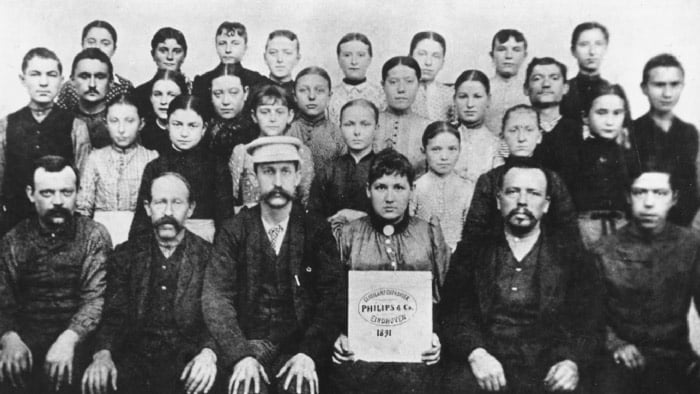When discussing technological evolution and progress, Philips stands as a beacon of innovation and adaptability. With roots stretching back more than a century, this company has left an indelible mark on industries ranging from lighting to healthcare. Let’s delve into Philips’ remarkable transformation from a small Dutch enterprise to a global leader in health technology. Uncover the advanced capabilities of the Philips 5500 LatteGo review
Humble Beginnings: The Foundation of Philips
Philips began its journey in 1891, established by Gerard Philips and his father, Frederik Philips, in Eindhoven, Netherlands. Starting with the production of carbon-filament lamps, this humble endeavor laid the foundation for a global electronics powerhouse. Despite initial financial difficulties and fierce competition, their commitment to quality and persistence enabled Philips to carve a niche in the industry. Get a closer look at the features of the Philips 5400 LatteGo review
Breaking Ground with Early Innovations
By the early 1900s, Philips had emerged as one of Europe’s leading light bulb manufacturers. Their success stemmed not only from large-scale production but also their dedication to innovation. A milestone in 1914 was the establishment of the Philips Research Laboratory (NatLab), which fostered a culture of discovery that fueled their expansion and groundbreaking advancements. Compare these two machines side by side in the Philips LatteGo 5400 vs 4300 review
Venturing into Radio Technology
During the 1920s and 1930s, Philips expanded into the burgeoning radio technology sector. Recognizing the growing appeal of radio broadcasting, the company began producing radios in 1927. By 1932, they had sold over a million units, showcasing their keen market insight and ability to meet consumer demands. Discover the differences among these models in the Philips 3200 vs 4300 vs 5400 review

Weathering World War II with Resilience
World War II presented significant challenges for Philips, including disrupted operations and damaged facilities. Despite these setbacks, the company displayed remarkable resilience. By relocating key personnel and continuing essential research, Philips contributed to advancements in radar and wartime technology, demonstrating ingenuity and determination during turbulent times. Learn how these two models compare in the Philips 3200 vs 4300 review
Post-War Growth and the Audio Cassette Revolution
The post-war era marked a new phase of innovation for Philips. In 1963, they introduced the compact audio cassette, a revolutionary product that transformed how people recorded and listened to music. This innovation not only became a global standard but also reinforced Philips’ reputation as a pioneer in consumer technology. See what sets these models apart in the Philips 3200 vs 5400 review
Redefining Music with the Compact Disc
In collaboration with Sony, Philips introduced the compact disc (CD) in the late 1970s, revolutionizing the music industry. The CD offered a durable, high-quality medium for digital audio, underscoring Philips’ ability to foster global partnerships and push technological boundaries. Get a detailed review of the Philips LatteGo 5400 review
Expanding into Consumer Electronics and Television
Philips continued diversifying in the latter half of the 20th century. They played a crucial role in developing the VHS format and later the DVD, reshaping home entertainment. Innovations like the Ambilight TV in the 1990s further cemented their status as leaders in consumer electronics. Discover the compact and efficient design of the Philips 3200 LatteGo review
Pioneering Healthcare Technology
Recognizing the potential of healthcare technology, Philips began investing in the sector in the 1980s. Over the years, they expanded into medical imaging, patient monitoring, and health informatics, solidifying their position as a leader in health tech. Strategic acquisitions and innovations allowed Philips to build a comprehensive portfolio aimed at improving patient outcomes and healthcare efficiency. Dive into the advanced features of the Philips 4300 LatteGo review
Shifting Focus to Health and Lighting Solutions
In recent years, Philips has strategically transitioned from traditional consumer electronics to health technology and lighting. The separation of its lighting division in 2016, which rebranded as Signify, enabled Philips to concentrate on health technology. This shift reflects a broader alignment with global trends emphasizing health and wellness.
Sustainability and Corporate Responsibility
Philips has consistently demonstrated a commitment to sustainability and corporate responsibility. With ambitious goals such as achieving carbon-neutral operations and adopting circular economy principles, Philips underscores its dedication to environmentally conscious practices and societal well-being.
Leveraging Digital Transformation
In the digital era, Philips has embraced artificial intelligence (AI) and data analytics to enhance its offerings. Focusing on connected care and smart health solutions, the company positions itself as a forward-thinking leader prepared for a future where technology revolutionizes healthcare delivery and patient outcomes.

Conclusion: A Tradition of Innovation and Resilience
Philips’ journey is a testament to the power of innovation, resilience, and adaptability. From manufacturing light bulbs in a modest factory to leading the charge in health technology, Philips has consistently evolved to meet the needs of a changing world. Their influence spans multiple industries, from transforming how we enjoy music to shaping the future of healthcare.
As Philips continues to pioneer advancements and address global challenges, their legacy exemplifies how a steadfast commitment to innovation and societal betterment can leave an enduring impact. The future promises to be as transformative and inspiring as Philips’ remarkable history.
